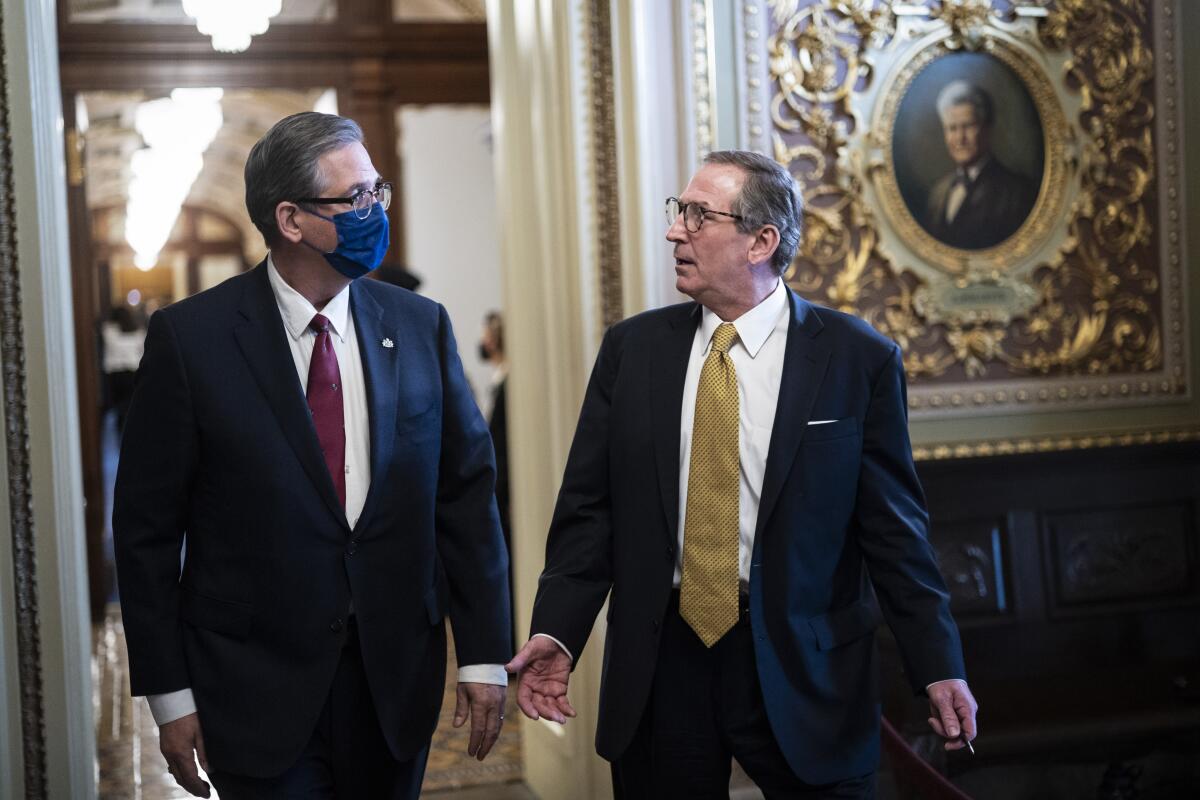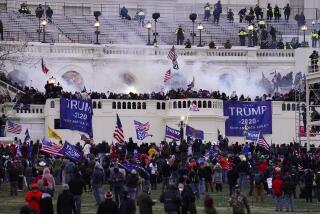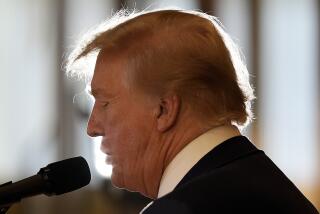7 Republicans vote guilty, but Senate acquits Trump in attack on Capitol

- Share via
WASHINGTON — The Senate acquitted former President Trump on Saturday in his second impeachment trial, even as seven members of his own party delivered a historic rebuke by joining Democrats in voting to convict him of inciting the deadly insurrection last month at the U.S. Capitol.
The 57-43 vote to find Trump guilty fell short of the 67 votes needed for conviction, but it was the most bipartisan vote in any presidential impeachment trial, exposing the fractures in a Republican Party divided over its future after Trump’s presidency.
The vote was immediately followed by a blistering indictment of Trump on the Senate floor by Minority Leader Mitch McConnell (R-Ky.), who had voted to acquit saying that impeachment of a former president was unconstitutional, but painted Trump as an unhinged menace to democratic institutions.
The Republicans who voted for conviction were Sens. Richard M. Burr of North Carolina, Bill Cassidy of Louisiana, Susan Collins of Maine, Lisa Murkowski of Alaska, Mitt Romney of Utah, Ben Sasse of Nebraska and Patrick J. Toomey of Pennsylvania.
Trump is the first American president to be impeached twice, and this trial, which lasted just five days, was the first of a former president. The House impeached him last month on a charge of inciting the insurrection Jan. 6, when a violent mob of his supporters broke into and ransacked the
Capitol. The assault left five people dead, including a police officer.
“It is now clear beyond doubt that Trump supported the actions of the mob, and so he must be convicted,” Rep. Jamie Raskin (D-Md.) said in his closing arguments. “If that’s not grounds for impeachment — if that’s not a high crime and misdemeanor against the republic of the United States of America — then nothing is. President Trump must be convicted for the safety and security of our democracy and our people.
“This trial, in the final analysis, is not about Donald Trump,” Raskin continued. “The country and the world know who Donald Trump is. This trial is about who we are.”
In their closing arguments, as they did during the trial, House Democrats played a collection of videos that showed graphic violence from the rioters’ attack, including heretofore confidential security video that revealed how close the mob got to lawmakers and staff. The videos — some filmed just steps from where the trial took place — provided an emotional punch to the case.
Trump’s attorneys countered that the former president had done nothing wrong, that his speech was protected by the 1st Amendment, and that his often pugilistic rhetoric was not meant to be taken literally. The mob, Trump’s legal team said, had acted on its own.
“There was no evidence Mr. Trump intended his words to incite violence,” attorney Michael van der Veen told senators in his closing argument. “The violence was pre-planned and premeditated by a group of independent actors.… His words weren’t what set this into motion.”
Most Republicans agreed, or argued that the Constitution didn’t even allow the Senate to hear the trial because Trump was now a private citizen — a sentiment that many legal experts have disputed.
Despite the acquittal, the shape of the vote reflected a Republican Party reassessing its ties to Trump. McConnell, sounding eager for some distance, unleashed a scathing screed against his actions. He accused Trump of happily watching the mob attack on television, and suggested that if Trump were still president he may be guilty of an impeachable offense.
The “mob was assaulting the Capitol in his name. These criminals were carrying his banners,” McConnell said. “The president did not act quickly. He did not do his job. He did not take steps so federal law could be faithfully executed.”
The GOP leader said Trump was liable for any crimes he committed and could still face prosecution in court.
Raskin said McConnell’s remarks reflected the potency of the proceedings, noting the Senate minority leader “made a series of statements that we didn’t even make, saying that this is not over yet by a long shot essentially, and that there is a path of criminal prosecution for the former president.”
McConnell was Senate majority leader when the House impeached Trump, but refused to immediately return the Senate to session and schedule a trial while Trump was still in office.
Trump’s defense team, meanwhile, celebrated with fist bumps as they departed in a subway car in the basement of the U.S. Capitol. “We’re going to Disney World!” Van der Veen said
facetiously.
Trump, in a statement, did not address the actions at the Capitol on Jan. 6 but derided the trial as another “witch hunt.”
“This has been yet another phase of the greatest witch hunt in the history of our Country,” he said in a statement. “No president has ever gone through anything like it.”
Unlike Trump’s first impeachment trial, in which Republicans rushed to defend the president, many GOP senators took no such steps this time. The vast majority of the Senate conference condemned the attack and many said Trump had played a role in inciting it, or should have done more to quell it.
Instead of defending Trump’s actions, they cited procedural or constitutional claims in their acquittal votes.
Most of the seven Republicans who supported conviction considered it quietly. Republican leaders made clear they were not whipping support for acquittal, instead leaving it to a vote of conscience, a nod that senators should not feel beholden to the party line.
Burr, for his part, had joined other Republicans in an unsuccessful effort to bar the trial on constitutional grounds, asserting that a former president is immune from such punishment. After losing that vote, he said he was open-minded about conviction.
“I do not make this decision lightly, but I believe it is necessary,” he said in a statement. “By what he did and by what he did not do, President Trump violated his oath of office to preserve, protect, and defend the Constitution of the United States.”
Toomey said Trump’s actions “betrayed the confidence that millions of us had placed in him. His betrayal of the Constitution and his oath of office required conviction.”
Last year, Romney became the first and, at that time, only senator to vote guilty in an impeachment trial of a president from his own party. The six GOP senators who joined him Saturday are likely to face blowback from Trump and his allies. Burr and Toomey plan to retire at the end of their terms, protecting them from any electoral fallout.
Trump has already threatened to support a primary opponent against Murkowski, the only one of the seven senators voting guilty who is up for reelection in 2022. She overcame a primary loss in 2010 with a write-in campaign.
Murkowski said she agonized over her vote and understands the political ramifications she may face.
“If I can’t say what I believe that our president should stand for, then why should I ask Alaskans to stand with me?” she said. “I cannot allow my vote, the significance of my vote, to be devalued by whether or not I feel this is helpful for my political ambitions.”
Both Sasse and Cassidy have already faced censure from Republican Party groups back home.
“Our Constitution and our country is more important than any one person. I voted to convict President Trump because he is guilty,” said Cassidy.
Even with the acquittal widely expected, the last day of arguments was a roller coaster of political drama. Democrats built an unexpected surge of momentum after winning a vote allowing them to depose a Republican congresswoman who threatened damning testimony against Trump — only to quickly slam on the brakes.
Facing the potential for a drawn-out fight over which other witnesses could testify, Democrats balked. They instead brokered a deal to place into the record a statement from Rep. Jaime Herrera Beutler (R-Wash.). It said that House Minority Leader Kevin McCarthy (R-Bakersfield) had told lawmakers he’d called Trump during the insurrection pleading for the former president to tell the rioters to stand down, but the president did not act.
Actual testimony from Herrera Beutler had the potential to be much more damaging for Trump and his supporters, and Democratic Party activists expressed exasperation that the impeachment managers stood down.
But they were weighing the damage that would be inflicted on Republicans against the political toll their own party’s agenda would endure in Congress through a prolonged trial.
President Biden is eager to move past the impeachment so Congress can focus on confirming his nominees and passing a large COVID-19 relief package. A longer trial would have held up that agenda.
Biden had steered clear of commenting on the impeachment process, but issued a statement late Saturday night saying “the substance of the charge is not in dispute” even though Trump was acquitted.
“This sad chapter in our history has reminded us that democracy is fragile,” Biden said. “That it must always be defended.”
House managers had debated until at least 3 a.m. Saturday over whether to call witnesses, according to a Democrat familiar with the negotiations. They did not notify their Senate counterparts of their plan until about 5 minutes before the trial was set to resume Saturday morning.
Once the vote to call witnesses was successful, it became clear the managers didn’t have a comprehensive plan on their next steps, according to the Democrat.
Shortly after brokering the deal on Herrera Beutler’s comments, House managers began their closing arguments. They were followed by the president’s lawyers.
During much of the week, including the Saturday session, it was clear that senators wanted the trial to wrap up quickly. And the lawyers obliged; neither side fully used its allotted time. By 3:40 p.m., not six hours after the Senate gaveled into session, the voting was done.
Times staff writer Chris Megerian contributed to this report.
More to Read
Get the L.A. Times Politics newsletter
Deeply reported insights into legislation, politics and policy from Sacramento, Washington and beyond. In your inbox twice per week.
You may occasionally receive promotional content from the Los Angeles Times.












